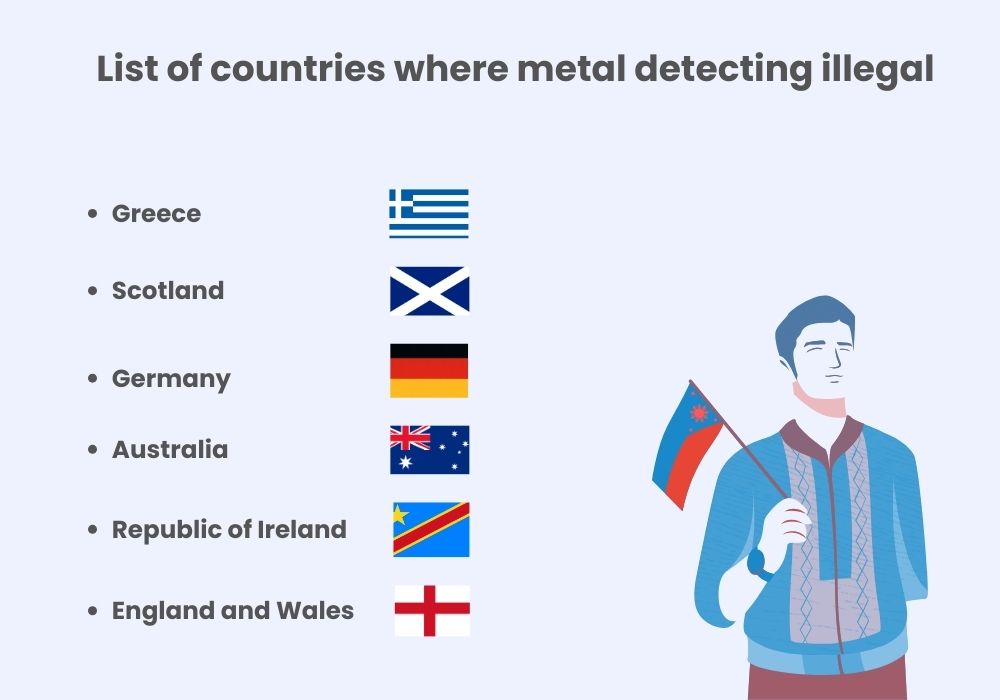Metal detecting illegal in certain areas due to concerns about cultural heritage preservation. Unauthorized digging can disturb historically significant sites, damaging valuable artifacts and erasing essential archaeological clues.
Metal detecting can be a thrilling hobby for many, but its legality is a complex topic that varies across different locations. While it’s not universally illegal, there are specific reasons and circumstances that lead to restrictions on this activity.
This activity, though seemingly harmless, may inadvertently harm the preservation of our shared history. Regulations aim to protect these sites and ensure their integrity for future generations, highlighting the importance of respecting and preserving cultural heritage.
What is the law on metal detecting?
The laws on metal detecting vary by location and can involve both national and local regulations. In many places, metal detecting is allowed on public land, like beaches and parks, but with restrictions to protect historical sites and artifacts.
However, on private property, permission from the landowner is typically required. Some countries have strict laws governing the search for historical artifacts or treasures, often requiring permits or licenses.
These laws aim to preserve cultural heritage and prevent disturbance to important archaeological sites. It’s crucial to research and understand the specific rules and regulations of the area where you plan to metal detect to ensure compliance with the law and respect for historical treasures.
Where Metal Detecting Might be Restricted or Illegal?
- Protected Areas: National parks, heritage sites, and other protected areas often have strict regulations against metal detecting to preserve their natural and historical significance.
- Private Property: Without explicit permission from landowners, metal detecting on private property is typically considered trespassing and is illegal.
- Cultural or Historical Sites: Areas with known historical importance might have restrictions or outright bans on metal detecting to safeguard their heritage.
- Public Property: Some cities and municipalities have regulations against metal detecting in public places due to concerns about damage to infrastructure or disturbance to the community.
What is the law in relation to the promotion of the sale or use of metal detectors?
Laws regarding the promotion of metal detectors typically vary by region. In many places, promoting the sale or use of metal detectors is legal for recreational purposes like treasure hunting or hobbyist metal detecting.
However, certain laws might prohibit their use in specific areas like historical sites, parks, or private properties without permission. Some regions have regulations on how and where they can be used to protect archaeological sites or prevent damage to the environment.
Additionally, promoting the sale of metal detectors to minors may have restrictions in some places to ensure responsible usage. It’s crucial to check local laws and regulations to understand where and how metal detectors can be used or promoted legally.
List of countries where metal detecting illegal

Sure, metal detecting illegal or restricted in certain countries due to various reasons such as preserving historical sites, protecting cultural artifacts, or ensuring public safety.
Here’s a brief overview of some countries where metal detecting illegal or highly regulated:
- England and Wales: Metal detecting is legal, but you need permission from landowners and should avoid certain areas like scheduled monuments.
- Scotland: Similar to England and Wales, you need permission, but there are stricter laws regarding historical sites.
- Republic of Ireland: Metal detecting is legal, but artifacts found on government-controlled land belong to the state.
- Germany: Strict regulations apply, especially concerning historical sites and war-related areas.
- Greece: It’s illegal without government authorization due to the abundance of historical artifacts.
- Turkey: Metal detecting is prohibited to protect the country’s rich archaeological heritage.
- Egypt: Strict laws are in place to safeguard historical treasures.
- Australia: Laws vary by state, but permission is typically required to detect on public land.
Before using a metal detector abroad, it’s essential to research and understands the laws and regulations of that particular country to avoid legal repercussions.
List of countries where metal detecting is allowed

Metal detecting is usually allowed in countries like the UK, France, Australia, and the USA, but rules vary. Always check local regulations as some areas might restrict or require permits for detecting to protect historical sites and artifacts.
Here’s a list of countries where metal detecting is generally allowed:
- United Kingdom: Metal detecting is popular and generally allowed, but there are regulations regarding historical sites and private property.
- United States: Laws vary by state and location; some public areas permit metal detecting, but historical sites and national parks may have restrictions.
- Australia: Generally allowed on beaches and public land, but national parks and heritage sites often have restrictions.
- Canada: Allowed on many beaches and public areas, but permission is needed for archaeological sites and private property.
- Germany: Permit is required for metal detecting in certain areas, especially historical sites.
- France: Regulations vary by region, but generally, detecting is allowed on beaches and in some public areas.
- Spain: Allowed on beaches and public land, but permission is required for historical sites and private property.
Remember, regulations can change, and it’s crucial to check local laws before using a metal detector in any country or location.
Conclusions
Metal detecting illegal in protected archaeological sites can result in severe fines and legal consequences. The legality of metal detecting hinges on a myriad of factors, including cultural significance, environmental impact, and property rights. While the allure of uncovering hidden treasures is undeniable, it’s crucial to balance this passion with respect for history, the environment, and local laws. By doing so, enthusiasts can contribute positively to preserving our shared heritage while enjoying their hobby responsibly.



